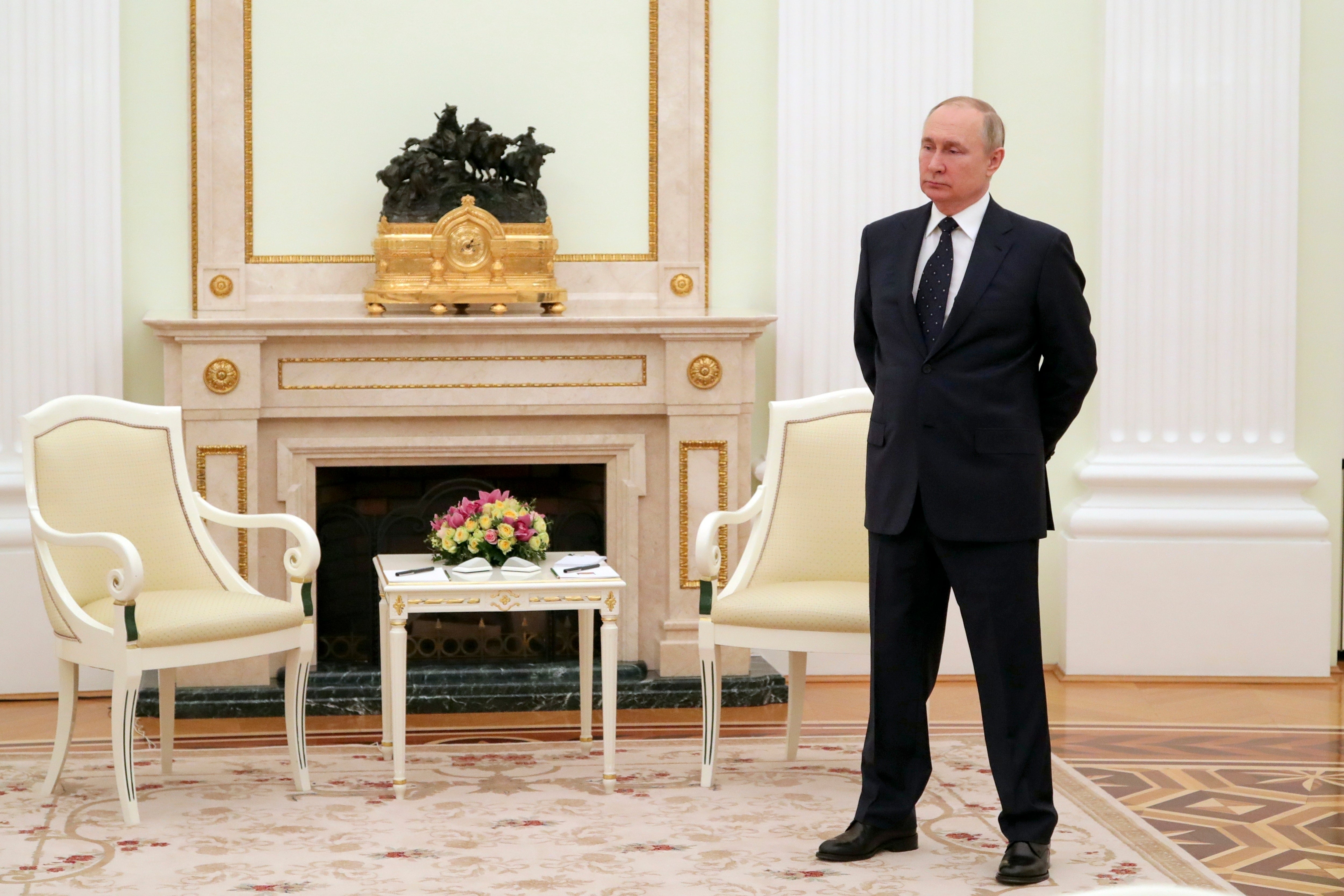Reckless, autocratic and surrounded by ‘yes men’: Putin has a lot in common with Gaddafi
After decades of people being too terrified to stand up to Putin or too compromised and invested to criticise his moves, he appears in many ways divorced from reality, writes Bel Trew


Speaking in the third person, addressing an (apparently) adoring crowd, the then-Libyan leader declared: “Muammar Gaddafi is not a president to resign, he does not even have a parliament to dissolve.”
With that characteristic downward look with an upturned chin, he was emphatic that there was “no position from which to step down." His audience obligingly cheered with approval. This was around two weeks into the 2011 revolution-turned-war that would ultimately bring about his demise.
At the time I remember thinking he must be spouting propaganda to keep his supporters – lovers of his somewhat mad Green Book – on side. Later, I learned that he genuinely believed this and that he was most likely delusional.
After decades of being surrounded by terrified “yes men” and sycophantic would-be hangers-on, by the end it appears he truly believed the nonsense he was saying. He was so divorced from reality he made reckless and unhinged decisions, and in the final moments couldn’t understand what was going on around him.
Long after he had been killed, his regime dismantled and Libya had dissolved into pointless cycles of violence, I was in Tripoli to cover the most recent war . In 2014, a Libyan friend and fellow journalist told me about an encounter he had had with one of Gaddafi’s close aides after he had been detained by the rebels.
The aide said at the point when Nato’s no fly zone was really biting, the death toll was soaring and it was clear Gaddafi’s time was up, he had personally begged the leader to step down and negotiate some kind of safe exit deal for them all.
In reply, Gaddafi had once again insisted he couldn’t step down because he had nothing to step down from. He said he had resigned in 1979 and since then had been Brother Leader of the Revolution. “How can I resign from being a president when I am not one?” he had spluttered. The man was delusional, this aide had told my friend.
Comparisons can be lazy but as I’ve been covering this bloody and horrendous invasion of Ukraine, I can’t help but worry that something similar has occurred in Russia. Not that President Putin is mentally unwell. I think that is an unhelpful and inaccurate reading of the situation. But after decades of people being too terrified to stand up to him or too compromised and invested to criticise his moves, after a lifetime of “yes men”, he appears in many ways divorced from reality. This has left him overconfident, reckless and angry.
He is quite literally isolated: these days he seems to issue all his orders from the ends of oversized tables. We saw flickers of that in the somewhat absurd dressing down he gave his spy chief shortly before launching the biggest ground invasion in Europe since the Second World War.
Sitting alone in another ludicrously ornate room, he quizzed his security council one by one before having a go at the normally hawkish Sergei Naryshkin. He repeatedly asked him to clarify what he was saying, to "speak plainly".
Naryshkin was actually stammering. “Thanks, you can take your seat”, Putin eventually says with a cruel smirk. So much ink has been spilled over whether this was deliberately staged or not (it apparently wasn’t live). But the eye-clawing anxiety in the room felt real, and it reminded me of the dangers of isolated autocrats, who are only told what they want to hear but still retain full power to act on that. And to fire on civilians.
To keep up to speed with all the latest opinions and comment, sign up to our free weekly Voices Dispatches newsletter by clicking here
Gaddafi is at the extreme end of this – and I’m reminded of that image of him rambling about the media being dogs while holding an umbrella in a tuk-tuk as his forces massacred thousands. But he is not the only isolated autocrat, who in his bubble unleashed hell. You can hear the utter disbelief in the secret audio recordings released by BBC Arabic of Zine el-Abidine Ben Ali’s final movements in power during the Tunisian revolution in 2011.
"What have I done to the street? I served it,” Ben Ali whines to his defence minister, who has advised him to stay out of the country he had just fled. It followed an obsequious taped calls with close confidante and media mogul Tarak Ben Ammar, two days before he officially resigned.
"You were wonderful, this is the Ben Ali that we’ve been waiting for!" says Ben Ammar in the recording. “It’s a historic comeback. You’re a man of the people. You speak their language," he says.
Surrounding powerful authoritarians with yes men and obsequious hangers-on is a lethal combination. And that may be what has been happening in the Kremlin all these years. This will have terrible consequences for Russia, because of searing global sanctions being thrown into a mixture of the Soviet Union and modern day North Korea (at least according to some Russians who have fled).
But hardest hit is, of course, Ukraine, whose citizens are playing for this senseless, pointless, needless invasion with their blood. Ukraine is bearing the brunt of Putin’s fantasies.






Join our commenting forum
Join thought-provoking conversations, follow other Independent readers and see their replies
Comments